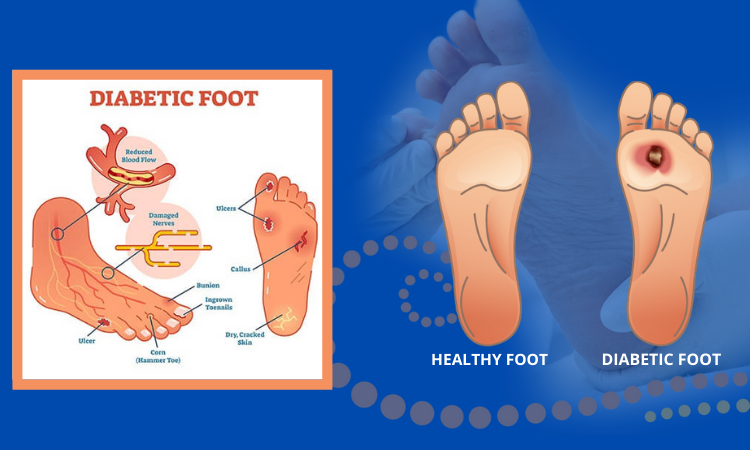Do you know that there are several types of diseases and infections and other health issues like nerve damage, circulation problem, and diabetes can lead to severe foot problems? But there’s nothing much to worry as you can take precautions to maintain healthy feet.
You know that diabetics are not allowed to eat anything that contains sugar to maintain a healthy lifestyle. Similarly to keep your feet healthy you will have to maintain a healthy lifestyle and manage diabetes.
And for this you can do the following: –
- Regular medical exams- this should include regular foot checks and also checking your blood pressure and cholesterol
- Eating a balanced diet rich in fruits and vegetables
- Regular exercise
- Monitor your blood sugar daily
Signs and Symptoms of Foot Problems
It’s important to look for the early signs and symptoms of foot problems that include: –
- Loss of sensation of touch, cold or heat.
- Burning sensations, tingling and painful feet.
- Loss of hair on the toes, lower legs and feet.
- Thickening and yellowing of the toenails.
- Changes to the color and shape of your feet.
And if you face any of the following problems then you should immediately consult a doctor or else the delays may result in severe health complications.
A good foot regimen is required to avoid any serious foot problems.
Daily foot care
Here are the top daily foot care tips that you must follow for healthy feet: –
Inspect your feet
You will have to inspect your feet carefully. Check the toes, tops, sides, heels, soles, and also the area between your toes. And if you can’t inspect your feet by yourself then ask someone to help or simply use a mirror. If you discover any sores, redness, cuts, blisters, or bruises then you should immediately contact your doctor or surgeon.
Wash your feet
Washing your feet will help you to keep them neat and clean and also healthy. So, use lukewarm water with mild soap to wash your feet every day. Keep that in your mind that hot water and harsh soaps can damage your skin. So, check water’s temperature by dipping your finger before putting your feet in. your diabetic foot may not be able to sense the water temperature immediately. Hence, you should use your finger for this.
Dry your feet
It’s really important to dry your feet, because infections develops in moist areas. So, use a soft towel and dry your feet.
Moisturize dry skin
If after washing and drying your feet you are feeling dry and rough skin then apply lotion or moisturizer on your skin. But, do not apply the lotion between your toes.
Check your feet daily
If you have poor blood flow then it’s really important to check your feet every day for sores, calluses, redness, blisters and any other problems.
Healthy foot habits
- If you are thinking for antiseptic solutions then do not use them without your doctor’s approval because this can burn your skin.
- Do not use a heating pad, electric blanket, or hot water bottle on your feet.
- Avoid walking barefoot. Not even around your house as it can cause injuries that can get infected.
- Protect your feet from heat and cold.
- Avoid sitting crossed legs and also standing in one position for long periods of time.
Potential complications
The foot care tips we have shared above will help you to avoid many problems. High blood sugar levels over time can cause nerve damages and also circulation problems, which can later contribute to foot problems.Other things like ingrown toenails, and sores that went unnoticed or left untreated can lead to severe infection. And the poor circulation makes healing an infection problematic. So it’s best to avoid them if possible.
Infections that make the skin and tissue to die and turn black are called as gangrene. Treatment can involve surgery to removing a toe, foot, or part of a leg.
Visiting the doctor
In case you are facing severe foot problems then you should visit your doctor. The doctor would examine your feet at every visit and also do a thorough foot exam once a year to check the condition of your foot. And if you have a history of foot problems then you should be checked more often. Your doctor or vascular surgeon in Delhi will give you lots of information on foot care and also answer all your queries related to the foot problems and surgery (if required).
Report any infections, corns,cuts, bruises, calluses, sores, or foot pain.
If necessary, your doctor can give you required information about some special shoes that may help in healing the pain and problems. And if the case is severe then he can recommend a podiatrist who specializes in diabetic foot care.
Note: –Always remember that the diabetes-related foot problems can worsen very quickly, if left untreated or unnoticed. So, it’s really important to seek prompt medical attention.

